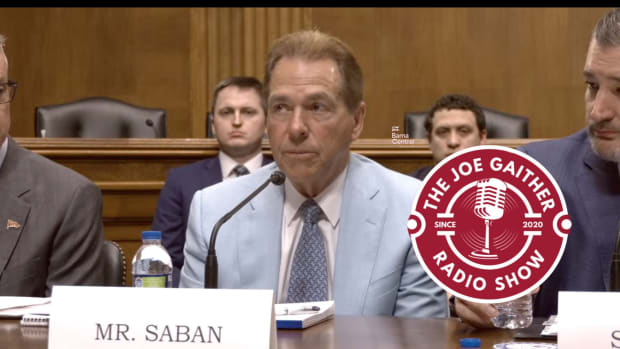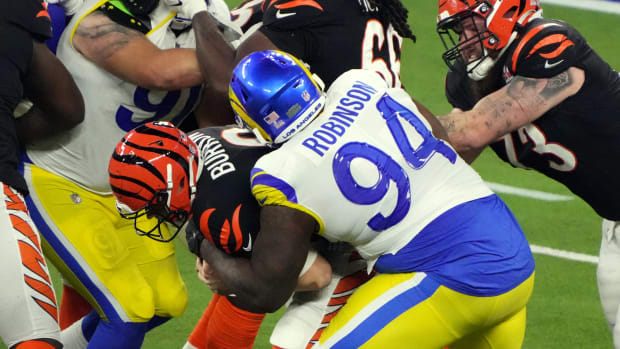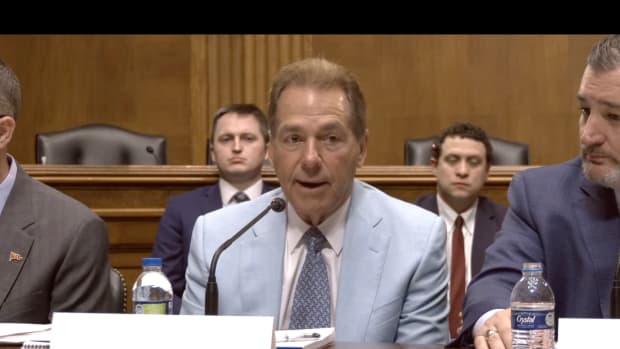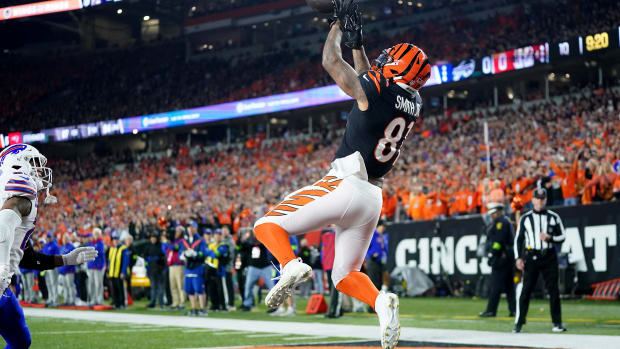There’s No Longer Any Such Thing as Business as Usual in Sports, Even at Alabama
TUSCALOOSA, Ala. — One could hear it in his voice.
Greg Byrne was talking with reporters from home on a teleconference Thursday when the emotions caught up to him. He was fielding a question about seeing the reaction of athletes on social media regarding their senior seasons being cancelled, and one post in particular reflected how they all felt.
It’s the one by softball’s Sarah Cornell, last season’s SEC Pitcher of the Year, who simply went out to the hill in an empty Rhoads Stadium. One has to think there were probably a few tears shed while out there alone.
“You just … [long pause] … feel for them,” the athletic director said. “And, uh, we got … one of the things that we sometimes forget, and I have to remember myself, physically you look at these kids and they’re so developed and are able to do things that most of us, including myself, are limited in our abilities, and they’re doing these activities at the highest levels.
“The work and energy and effort that goes into, to have to see that taken away from them is heartbreaking.”
This is the realty of college athletics now, not just at the University of Alabama, but across the nation and world, where organized sports have completely stopped.
Just a week ago the decision was made to pull the plug on the SEC Men’s Basketball Tournament in Nashville after the first-round games had been played. Next up was Alabama vs. Tennessee.
That seems like a lifetime ago.
"My days are blending together,” Byrne said. “It's Thursday, right?"
Like so many, Byrne has been working at home during what may believe is the pinnacle of the sports year, and what fills the most coffers for the colleges. Football may still be king, but the men's basketball tournament funds the NCAA's existence, and everyone gets a cut.
Even though Alabama was a longshot to make the field this year, the school was set to make a “couple of million dollars,” Byrne said. “That’s our best estimate at this point.”
That means a slight smaller budget. Having no baseball or softball games won't have much of a financial impact, neither will cancelling A-Day. Alabama traditionally doesn’t sell tickets and makes very little off the concessions. Attendance was going to be limited anyway due to construction, so at least monetarily there’s little concern there.
Meanwhile, the athletic department is trying to recoup some of the travel expenses that had to be cancelled. Eventually, it hopes the SEC reschedules the softball and tennis championships that were to be played in Tuscaloosa for the near future instead of Alabama going back in the rotation and having to wait another 13 years.
Everyone is still on staff, but at some point that could eventually change. The workers from games and events already know they're going to take a hit, although Alabama is looking into getting them a little financial relief.
“That’s been one of the things we have discussed,” Byrne said. “We haven’t come up with a final plan on that at this point.”
Those are all secondary concerns, though.
“The importance of sports is minimized during these times,” Byrne said.
"Right now there's just a lot of unknowns."
Two huge issues that will continue to loom over both Byrne and Alabama are the ongoing renovation of Bryant-Denny Stadium, and the potential delay/cancellation of the 2020 football season.
If construction stops, the ramifications could be vast. Among them, where would the Crimson Tide play in the fall if the season somehow went on as scheduled? The plan for A-Day was to allow 30,000-35,000 fans into limited seating, but that might not be option for a regular-season game.
“The construction continues,” Byrne said. “We’re on schedule. It’s been a wet spring, but I can tell you we’ve had our regular conversations with our general contractor on this to make sure that they’re taking necessary steps during this new reality we’re in.”
This is phase one of the Crimson Standard, which targeted raising $600 million as part of a 10-year initiative to upgrade nearly every facility, and Bryant-Denny twice.
One has to believe that the timetable will significantly change due to the massive ongoing economic downturn stemming from the novel coronavirus COVID-19 crisis. It could be twofold if phase one is delayed.
As for the 2020 football season, Byrne has no feel for which way that could potentially go.
“I think we’re still too early to really have strong opinions about that,” he said. “All of our focus has to be on the health and wellness of everyone involved. And if we as a country do our very best to minimize the spread of this virus, that gives us the best opportunity to return to normal as a country as soon as possible. And that’s what needs to be the focus right now.”
Meanwhile, here’s something else that Byrne has to be prepared for, and definitely doesn’t want to think about: What happens when a Crimson Tide athlete tests positive?
Byrne said that as far as he knows, none have done so yet.
Here’s hoping that doesn’t change, but like with everything else it’s hard to be optimistic.
In the meantime, Byrne’s doing what he can from home, regularly talking to both the league office and his coaches including Nick Saban, and prioritizing what he can. It’s way too early to start looking for the dove with the olive leaf, signaling that an eventual return from this will eventually happen.
Yet in the bigger picture, he knows that the flood has just begun.





